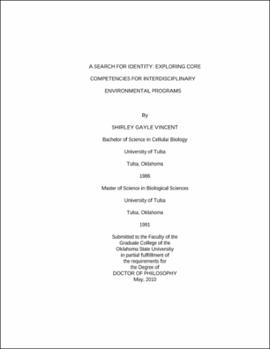| dc.contributor.advisor | Focht, William J. | |
| dc.contributor.author | Vincent, Shirley Gayle | |
| dc.date.accessioned | 2013-11-26T08:29:52Z | |
| dc.date.available | 2013-11-26T08:29:52Z | |
| dc.date.issued | 2010-05 | |
| dc.identifier.uri | https://hdl.handle.net/11244/7120 | |
| dc.description.abstract | Scope and Method of Study: | |
| dc.description.abstract | The study is national in scope, exploratory, and utilized a combination of qualitative and quantitative social science methods. | |
| dc.description.abstract | Findings and Conclusions: | |
| dc.description.abstract | Interdisciplinary environmental (IE) programs in higher education in the United States are both diverse and dynamic in their curriculum designs. Though these characteristics afford flexibility and adaptability, they are also seen as weaknesses that can undermine their perceived legitimacy both within and beyond their host institutions. The lack of a clear identity, definition of core competencies, and prescriptions for interdisciplinary pedagogy can create confusion among program stakeholders and skepticism among institutional administrators. To address these concerns, the National Council for Science and the Environmental sponsored a comprehensive national study to learn more about IE program curricula and investigate the potential for reaching agreement on core competencies. The results demonstrate that a consensus exists on IE field identity: an applied, interdisciplinary focus on the interface of coupled human-natural systems with a normative commitment to sustainability. The results also reveal that IE program interdisciplinary core competency areas consist of three broad knowledge areas and two skill sets, and that three ideal curricular models for IE education are espoused by interdisciplinary environmental program administrators: systems science, policy and governance, and adaptive management. The characteristics and program attributes related to these models are explored and the relationships explained. The study concludes with a discussion of the implications of the findings for building capacity in the environmental professional workforce, a brief description of the next planned phases of the project, and expresses the author's optimism that a consensus can be forged on core competencies and model-specific prescriptions for curricular content for higher education IE programs. | |
| dc.format | application/pdf | |
| dc.language | en_US | |
| dc.rights | Copyright is held by the author who has granted the Oklahoma State University Library the non-exclusive right to share this material in its institutional repository. Contact Digital Library Services at lib-dls@okstate.edu or 405-744-9161 for the permission policy on the use, reproduction or distribution of this material. | |
| dc.title | Search for identity: Exploring core competencies for interdisciplinary environmental programs | |
| dc.contributor.committeeMember | Caneday, Lowell | |
| dc.contributor.committeeMember | Shriver, Thomas E. | |
| dc.contributor.committeeMember | Warde, William D. | |
| osu.filename | Vincent_okstate_0664D_10775.pdf | |
| osu.accesstype | Open Access | |
| dc.type.genre | Dissertation | |
| dc.type.material | Text | |
| dc.subject.keywords | environmental core competencies | |
| dc.subject.keywords | environmental curricula | |
| dc.subject.keywords | environmental degree program design | |
| dc.subject.keywords | environmental degree | |
| thesis.degree.discipline | Environmental Science | |
| thesis.degree.grantor | Oklahoma State University | |
